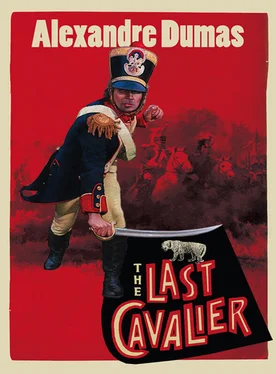Jean had recognized Monsieur Doley. He ran up to him. “Oh, Master Doley,” he said. “I’m not mistaken. You are. They aren’t real gendarmes. In the name of heaven, don’t open up.”
“I know what’s happening and what I have to do,” said Jacques Doley. “Go back to your rooms and lock yourself in. Or if you are afraid, take your wife and go hide in the willows. They will never look there for you.”
“But you! What about you?”
“There’s someone here who has promised to defend me.”
“Come on, are you going to open up?” roared the leader of the supposed gendarmes, “or must I break the gate down?” And once again they pounded three or four times on the gate with the butts of their guns, which threatened to knock the gate off its hinges.
“I said I was going to open up,” shouted Jacques Doley.
And he did.
The brigands swarmed over Jacques Doley, grabbing him by the collar. “Gentlemen,” he said. “Don’t forget that I willingly opened the gate for you. You realize that I have ten or eleven men working here. I could have given them weapons. We could have defended ourselves from behind these walls and done severe damage before surrendering.”
“But you didn’t. Because you thought you were dealing with gendarmes and not with us.”
Jacques showed them the ladder placed against the wall. “Yes, except that Jean saw you all from up on that ladder.”
“Since you did open the gate, what do you expect?”
“That you will be less demanding. If I had not opened the gate, you might have burned my farm in a moment of rage!”
“And who’s to say that we won’t burn your farm in a moment of joy?”
“That would be unnecessary cruelty. You want my money, fine. But you do not wish my ruin.”
“Well, now,” said the chief, “finally someone who’s reasonable. And do you have a lot of money?”
“No, because a week ago I paid all my bills.”
“The devil take you! Those are not the kind of words I want to hear.”
“They may not be what you want to hear, but they are the truth.”
“Well, then, we were given bad information. For we were told that you’d have a large sum of money here.”
“Someone lied to you.”
“No one ever lies to George Cadoudal.”
By now, they had gotten closer to the farmhouse and were pushing Jacques Doley into the kitchen. The brigands, unused to such coolness from one of their prey, were looking in astonishment at the farmer.
“Oh, gentlemen, gentlemen,” said Madame Doley, who had once again gotten up and left the bedroom, “we’ll give you everything you want, but please you won’t hurt us, will you?”
“Say,” said one of the brigands, “you’re like an Auray eel, crying before you’re skinned alive.”
“Enough words,” said the chief. “The money!”
“Woman,” said Doley, “give them the keys. These gentlemen will look themselves. That way they cannot accuse us of trying to fool them.”
The woman looked at her husband with surprise, and made no move to obey. “Give them the keys!” he said again. “When I say give them, you give them.”
Agape, the poor woman could not understand why her husband was so readily acquiescing to the brigands’ demands. But she gave the leader the keys, then watched in fear as he walked over to the huge walnut wardrobe, the kind in which farmers usually lock up their most valuable possessions, beginning with their linens.
In one drawer they found silverware. The chief grabbed it up and tossed it onto the middle of the tiled kitchen floor. To Madame Doley’s great surprise, she counted only six place settings when there should have been eight. In another drawer they’d had a sack of silver and a sack of gold, about fifteen thousand francs in all. But however much the chief dug through the drawer, to the woman’s great astonishment, all he came up with was the sack of silver.
The wife tried to exchange a look with her husband, but he did not look back. One of the brigands, however, caught the flash of her glance. “Well, now, Mother,” he said, “is your august husband trying to trick us?”
“Oh, no, gentlemen!” she cried. “I swear.”
“Perhaps you know more than he does. Very well, we’ll start with you then.”
The brigands emptied the wardrobe but found nothing else of value to them. They emptied a second wardrobe as well and found only four louis, five or six six-pound crowns, and a few coins hidden in a bowl. “I think you might be right,” said the chief to the brigand who had accused the woman of trying to trick them.
“Someone warned him we were coming,” said one of the bandits, “and he has buried his money.”
“Thunderation!” said the chief. “We have ways of getting money to come out of the ground. Come, bring me a bundle of wood and some straw.”
“Why?” cried the woman in terror.
“Have you ever seen a pig roast?” the chief asked her.
“Jacques! Jacques!” the woman cried. “Do you hear what they’re saying?”
“Of course I can hear,” said the farmer. “But what do you expect? They are the masters, and we have no choice but to let them do whatever they want.”
“Oh, Jesus!” cried the woman in desperation, as two brigands came from the bake house, one carrying a bundle of straw, the other some sticks. “How can you be so compliant?”
“I trust that God will not permit such an abominable crime as the destruction of two creatures whom I cannot call innocent of any sin, but certainly they’re innocent of any crime.”
“What do you mean?” asked the chief. “Is God going to send an angel to protect you?”
“It would not be the first time,” said Jacques, “that God would show himself through a miracle.”
“Well, we’ll see about that,” said the chief, “and to give him the opportunity to kill two birds with one stone, we’ll burn the sow along with the boar.” Shouts of laughter greeted his joke, all the more so because it was crude.
The brigands grabbed Jacques Doley, tore off his shoes, pants, and stockings. They ripped off the woman’s skirt. They tied them up separately but similarly, with their hands behind their backs and made them sit on the floor with their legs stretched out. When the fire had caught, they pushed the farmer and his wife by the shoulders until their feet were just a few inches away from the flames. Both cried in pain at the same time.
“Wait!” said one of the brigands, “I’ve just found the piglets. We need to roast them along with the father and mother.” Into the room he dragged a child in each hand; he’d found them quaking and weeping on the floor behind their mother’s bed.
Jacques Doley could stand no more. “If you are a man,” he shouted, “it is time to keep the promise you made!”
Scarcely had he pronounced those words than the milk house door was thrown open. A man came out, his arms extended, and in each hand he held a double-barrelled pistol.
“Who is the man they call George Cadoudal?” the man asked.
“I am,” said the tallest and heaviest of the masked men, getting to his feet.
“You’re lying,” said the stranger. And he shot the bandit point-blank in the chest.
“I myself am Cadoudal,” he said. The impostor fell, dead.
The bandits took a step backward. They had indeed recognized the real Cadoudal, who, they’d assumed, was still in England.

IT WAS CADOUDAL, and not a man among the band of indenciaries—or in all of the Morbihan—who would dare to raise a hand against him or hesitate to obey a single one of his orders. So the second in command, who was still holding the children, released them and walked over to Cadoudal. “General,” he said. “What are your orders?”
Читать дальше













